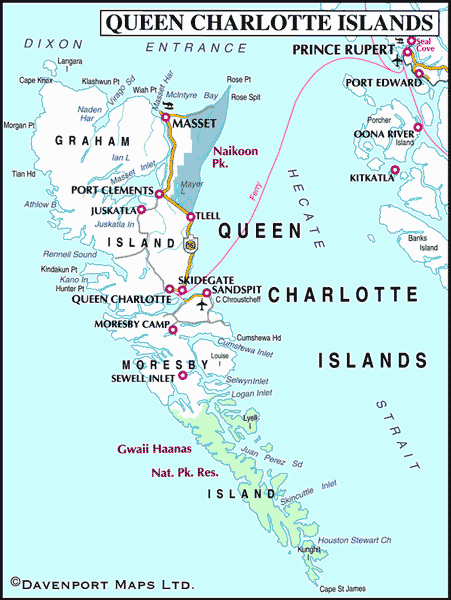Premier Listings for Port Clements
At the estuary of the Yakoun River, on the northeast shore of Masset Inlet, the logging and fishing village of Port Clements, once known as Queenstown, is a wonderful place to observe the giant trees of the temperate rainforest.
Established in 1907, Port Clements became the first incorporated town in the Queen Charlotte Islands in 1914, named after Herb S. Clements, the local member of parliament.
Logging is the mainstay here, which thrived during the First World War when Port Clements became the supply centre for logging camps around Masset Inlet, harvesting giant spruce trees used in the construction of military airplanes for the war.
Population: 517
Location: The village of Port Clements is situated just off Highway 16 at the centre of Graham Island, 45 minutes north of Queen Charlotte City, and 30 minutes south of Masset. The Haida Gwaii islands are accessed by ferry from Prince Rupert to the Skidegate Landing Ferry Terminal on Graham Island, by air from Vancouver to Sandspit on Moresby Island (770 km), and by air from Prince Rupert to Sandspit. Other commercial air services (including float planes and helicopters) are available at Sandspit, Queen Charlotte City and Masset. A 20-minute ferry ride connects Graham and Moresby Islands.
Visit the waterfront Port Clements Settlers Museum for an interesting peek into the lives of settlers in Port Clements in the early days. On display are pioneer artifacts and historical photographs of logging camps and the early Port Clements village.
Forestry Tours depart from the Visitor Centre and the Port Clements Museum twice per week during the summer. These bus tours to nearby Juskatla provide a good insight into modern logging operations, including reforestation, logging road construction, and the operation of self-dumping barges.
The largest log barge in the world operates in Masset Inlet and Masset Sound. The self-propelled and self-dumping barge, the Seaspan Survivor, formerly the Haida Monarch, is 129 metres (423 ft) long and 26 meters (85 feet) wide, and can transport 15,000 tons of felled trees per load – equal to the contents of 400 logging trucks, or 12,000 telephone poles. The self-loading barges are fitted with enormous cranes and water tanks that are flooded during offloading, causing the barge to list and dump its load into the water, to be manoeuvered into log sorting grounds by tugs. The smaller Haida Brave is 121 metres (397 ft) long and 25 metres (82 ft) wide, with a load capacity of 10,000 tons.
Spread out over several days, Port Clements celebrates Canada Day (July 1st) in a big way, with a parade, a ball tournament, concessions and games.
A legendary Golden Sitka Spruce grew on the west bank of the Yakoun River, approximately 6 kilometres south of Port Clements. The most famous tree on Haida Gwaii put Port Clements on the map, until an act of insane vandalism felled the sacred tree in 1997. The Haida believe the tree held the spirit of a boy named Kiidkayyaas, who was transformed into the Golden Spruce when fleeing his village after a snowstorm came as punishment to his people. The ten-minute trail to the river still makes for a lovely walk.
On the east side of Juskatla Road, a few kilometres south of the Golden Spruce site, watch for the signs to a partly carved Haida cedar canoe, abandoned more than a century ago. The bow of the canoe points toward the stump of the cedar from which it was cut, with the stump clearly showing the adze marks of the Haida canoe builders. Many unfinished Haida canoes lie in the forests on the islands, but this 15-metre (50-foot) canoe is the most accessible of them, with a boardwalk and trail into the canoe site.
The Yakoun Estuary, Kumdis Bay and Stewart Bay all attract a wonderful variety of waterfowl and shorebirds, including the largest island wintering population of Trumpeter Swans. Migration is an exciting time, with large flocks of migrating birds flying overhead.
Wildlife Viewing in Northern BC & Haida Gwaii
Scuba Diving is available through dive companies operating out of Port Clements and Masset, and fishing, hiking and kayaking are the main recreational activities in and around Port Clements.
Kayaking: Paddlers can launch their kayaks in Masset Inlet, or drive south to Juskatla and launch on Juskatla Inlet, for more protected waters and quiet bays.
Canoeing & Kayaking in Haida Gwaii (Queen Charlotte Islands).
Fishing: Fishermen can test their skills on the Yakoun River, famous for its steelhead, as well as the Mamin River. The Yakoun and Mamin River systems together include all 5 species of Pacific salmon (chinook, coho, chum, pink and sockeye), as well as rainbow trout, cutthroat trout and Dolly Varden char.
Fish Hatchery: The Yakoun River is the only stream system on the Queen Charlotte Islands that naturally supports a chinook salmon stock. This wild stock is enhanced by the efforts of the Yakoun River (Marie Lake) Fish Hatchery. The Yakoun River is also a major producer of steelhead in Haida Gwaii, offering great salmon and steelhead fishing.
The Mamin River, which flows into Juskatla Inlet, supports a good run of coho salmon from mid September to mid October, and a good steelhead run from January to March. The Port Clements Salmon Enhancement Club works on the Mamin River and provides Yakoun River chinook to the Port Clements school feeding and release program.
There’s a boat launch and picnic facilities at Mayer Lake, midway between Tlell and Port Clements, and wilderness camping along the lakeshore for people making extended fishing voyages. Mayer Lake and Tlell River are the most accessible freshwater fishing spots in Naikoon Provincial Park.
Pure Lake Provincial Park is a popular swimming and picnicking spot encompassing and protecting Pure Lake, located about 15 kilometres south of Masset on the island highway. No camping facilities are available at the park, but public toilets, picnic tables and firepits are provided.
Logging Roads: The network of logging backroads south to Queen Charlotte City is open to the public after working hours only. A logging road map and clearance are available from Juskatla.
Masset Sound (25 miles/40 km long) is a fast-flowing connection between Dixon Entrance, the body of water betweenHaida Gwaii and Prince of Wales Island in Alaska, and the ecologically unique Masset Inlet. The village of Masset is located at the mouth of Masset Sound, and Port Clements sits on the eastern shore of Masset Inlet, which leads into Juskatla Inlet, and the logging camp of Juskatla on the eastern shore.
North of Port Clements is the village of Masset, the largest town on Haida Gwaii, and the northern gateway to Naikoon Provincial Park. Masset is located at the northern end of Graham Island, the largest of the more than 150 significant islands that comprise the Haida Gwaii islands.
Southwest of Port Clements is the logging camp of Juskatla, located off Masset Sound. Juskatla was established on Mamin Bay in Juskatla Inlet in the 1940s, to supply spruce for warplanes.
Circle Tours: See the best of Northern BC and Haida Gwaii on one of the Circle Tours that capture the wonders of the north. The Inside Passage Circle Tour and the Native Heritage Circle Tour include Haida Gwaii by catching a ferry from Prince Rupert to Haida Gwaii (formerly the Queen Charlotte Islands).
Circle Tours in British Columbia.
Premier Listings

Biographical Info
Chromer Sport Fishing is the trusted source for the best BC fishing trips out there! We are a licensed guiding operation located in Vancouver, BC and a full-service booking agency for all the top freshwater and saltwater fishing adventures in BC.
We offer salmon fishing charters, Vancouver fly fishing trips, and BC sturgeon fishing adventures, all right from Vancouver. We also offer steelhead fishing trips in Northern BC, winter steelhead fishing on Vancouver Island, and saltwater salmon fishing out of a lodge on Langara Island in Haida Gwaii.
Owner Operator Yos Gladstone has been a salmon and steelhead guide since 1998, spending over 200 days a year guiding and fishing in BC. He started Chromer with one mission in mind: to showcase fishing in BC and offer the kind of trips he’d like to go on. Chromer Sport Fishing looks forward to earning your business and being a part of your next fishing adventure in British Columbia.



